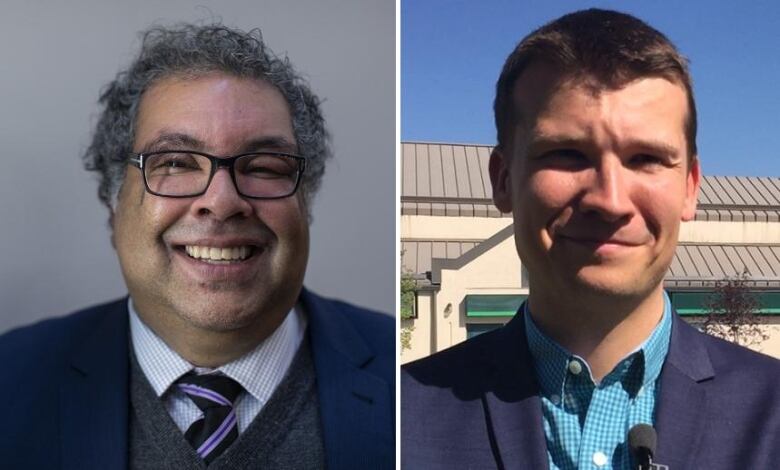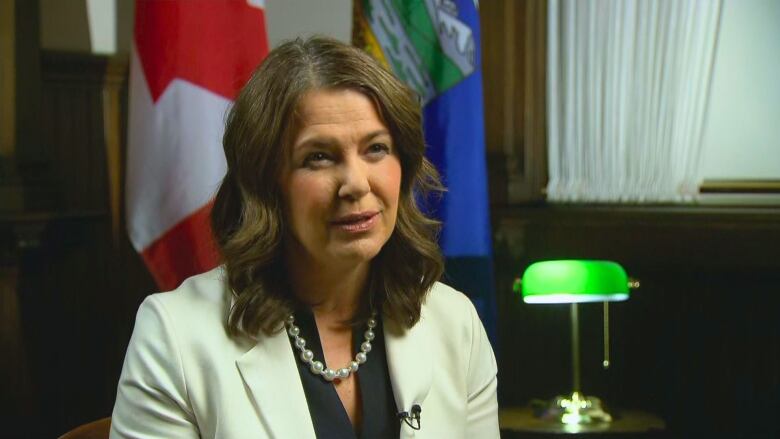Naheed Nenshi and Jeromy Farkas reflect on election results, what happens next
Former mayor and councillor are part of the Calgary Eyeopener's political panel
Throughout the provincial election, former Calgary mayor Naheed Nenshi and former city councillor Jeromy Farkas have joined the Calgary Eyeopener to share their thoughts on the latest developments in the campaign.
They joined host Loren McGinnisonce again Tuesday morning as part of their weekly political panel to reflect on the results, and what happens next.
LISTEN | Naheed Nenshi and Jeromy Farkason the provincial election results:
The following has been edited for length and clarity.
LM: What do you make of how things unfolded last night, Jeromy?
JF: Oh man, it was close. And just to put it into perspective, if [about 1,300]people had changed their minds, it would have changed the outcome of the election completely.This was a nail-biter down to the wire, and both parties, I think, are going to spin this as a victory, but there's no winning like winning. So it's a clean majority that Danielle Smith won, and even if a couple of these seats ultimately through recounts don't favour the UCP, I think she's in a very strong position, not just her caucus, but her own leadership prospects.
Thinking back, there's a couple of key moments that I think really sealed the deal to carry Calgary in the way that they did. I think the first one was sort of the implicit endorsement from our Calgary city council and support of things like the arena, more cops for the downtown and sidelining the local council and mayor, who had sort of campaigned in terms of standing up to the UCP a couple years ago.Having them sidelined, or tacitly endorsing the UCP, I think really helped.
Another issue was Stephen Harper's endorsement. It really lent the UCP the credibility that they needed to be able to change the channel from some of these controversies. As well as going into the debate, I think Danielle really appeared poised. She appeared confident, and it was quite a big risk for the NDP to focus on leadership and trust when these issues are important, but they rank maybe No. 4, No. 5. It left a lane open for the UCP to really talk about crime and safety, affordability, all of these issues in a relatively positive away.
LM: Your big takeaway, Naheed?
NN: This was a very strange result. You can cut the numbers in a gazillion different ways. It's one of these where the score doesn't really tell the story of the game. The score is [49 UCP elected, and 38 NDP, as of Tuesday afternoon].
This is actually the smallest majority that we've ever seen in Alberta, just [a few]seats, if you countthe candidate from Lacombe-Ponoka who will not be sitting in the UCP caucus. So that way it's close. As Jeromy said, [0.7 per cent] of the vote, according to University of Calgary economist Trevor Tombe, would've flipped this to a NDP majority, yet the UCP won by eight per cent in the popular vote. So it's kind of all over the map when you think about it. What is clearis that Alberta is more divided than it has ever been, and I think there were a number of potential changes during the election. I don't think there really was a turning point. What we kind of anticipated on May 1 is almost what happened on the last day.
I do think that what we saw was that from the very beginning, the NDP had a very, very difficult path. They had only one path to victory. They had no margin of error. And so what ended up happening is they lost in a couple of seats in Calgary that I was surprised at. They won the bellwether seats, but that wasn't quite enough. And Jeromy said that the UCP took Calgary. In fact, the NDP took Calgary, both in the popular vote and in the number of seats, but it was almost half and half. So, it was interesting because for the NDP now, they've done very well. They've got the largest opposition in Alberta history, but they didn't win. And so they really have to think hard on what their path is to 45 [seats] in the future and what that looks like.
LM: Naheed, with a new mandate, albeit smaller than in 2019, what do you now expect from this government?
NN: I was really taken by Danielle Smith's speech last night. I thought both speeches were wonderful. I would've liked to have seen more of each of those leaders during the campaign. I thought that Rachel Notley was self-deprecating and funny, but also passionate, and I actually thought that Danielle Smith, her speech was almost perfect. I'd already sort of pre-written my column for after the election talking about how the narrow victory is actually just like in the U.S. with Kevin McCarthy going to embolden the radical people in her caucus. And I was actually going to use a line saying that we used to hear in every victory speech a line that said, 'And for those who didn't vote for me, I'm going to work hard to earn your vote next time,' and we never hear that anymore. And we heard that from her. We heard some very gracious comments about Rachel Notley, and then we heard some fierybut frankly, not that fieryattacks against Justin Trudeau and Ottawa, but kind of specifically focused on a couple of policies.

Now if that Danielle Smith that's the one that Jeromy keeps telling us is so good one-on-one if that Danielle Smith is the one who shows up to work, and she can actually hold her caucus in a place like Stephen Harper did, saying, 'Listen, we can get a couple of things done that you really want, but in reality, our job is to consolidate and grow our power base,' then that's actually a very good thing. But the thing I keep saying is I just don't know which Danielle Smith is going to show up to work. Jason Markusoff has a good piece asking the exact same question. But if it's the one we saw last night who shows up, then I think we're going to have a very different tone than all the drama of the last seven months.
LM: What do you think,Jeromy? Which Danielle Smith shows up to work, if we accept the premise that there's these two versions, which seems a little crude.
JF: I think politics is always sort of about the path of least resistance. So it's really going to come down to some of these races in Calgary that are due for a recount. And if you have more moderate perhaps UCP candidates winning their election, that will shift at least some of the focus of the team and the potential cabinet in a certain direction. But if it's largely rural dominated, with say 80 per cent ormore coming from a rural caucus, I think you're going to see an outsized impact and influence of groups like Take Back Alberta, who are taking credit for this victory.
But I think, overall, I think this is a time for consolidation. I think her immediate steps are going to be to try to stave off any type of leadership challenge. I think they're going to be pushing soon for a leadership review so that when they're high on victory, she can at least getthat endorsement from the membership now. And as far as what the NDP do next, I think there's going to be a bit of soul-searching.
There's certainly progressives out there within the party that may be thinking that Rachel Notley brought the party too close to the centre, and by abandoning say their democratic-socialist roots, that's the reason they weren't able to make the inroads. It didn't surprise me though to see Rachel Notley not make a decision about her own leadership, at least in the moment, especially given how so many of these seats are going to be due for a recount. It's really unclear in terms of what their caucus will look like.

But I think both parties, I think privately, will be thinking what went wrong. And just the fact that this was such a nail-biter and it was so close, I think is a bit of a condemnation on the UCP in terms of their campaign. When you look at other political parties across Canada, like the Doug Ford PCs, when you have such favourable economic conditions like this for an incumbent, you really should be able to walk away with the election. But the fact that it came so close and the NDP made such inroads in terms of their organization really shows us that Alberta politics is definitely exciting and for once in our lives, we actually have a competitive race where we don't know who is going to win the election as a matter of course.
LM: Naheed, what do you think is the path for the NDP as they consider whether they can beat a party that's united on the right?
NN: I agree with Jeromy that I'm glad that Notley did not step down last night. I think that party is going to need some stability as they figure out how to manage being the largest opposition in Alberta's history, but also as they start thinking about how they need to expand their power base beyond kind of and you've heard me say this beforethis path where they had to be absolutely perfect and win every competitive seat. So how do they become competitive maybe not in pure rural Alberta, but in places like Grande Prairie or Red Deer or Medicine Hat?How do they win that other seat in Lethbridge? They have to think a little bit about what that means for them as a party and what their positioning is. They're very much the party of urban Alberta now, big city Alberta, but then what?
In fact, I would say that the NDP's big loss last night was not so much the fact that they lost a couple seatsin Calgary, but they didn't do very well in the so-called 'doughnut' around Edmonton. They only picked up one seat there, and it was the most urban of those seats. So they really need to think hard about, do they want to be, as Jeromy said, do they want to be a more centrist party, do they want to be a more progressive voice? I don't think they lost any of those progressive votes last night, but maybe that's a danger in the future. So it'll be a really interesting question for them to move forward.
The blunt question some people are asking is, 'If you can't beat Danielle Smith, can you ever win?' And that's a fair question, but I don't think that that's a fair question considering the makeup of the NDP today. And the question is what will the makeup of the NDP be in the future, and could they beat an even stronger UCP candidate?There was one poll done that showed that if the UCP had a different leader, they would have run away with this. That's all hypothetical. You never know if it's true. But there are questions about how you need to strengthen the NDP's base for when you go up against someone who's a better candidate than Danielle Smith.
With files from the Calgary Eyeopener













_(720p).jpg)


 OFFICIAL HD MUSIC VIDEO.jpg)
.jpg)



























































































